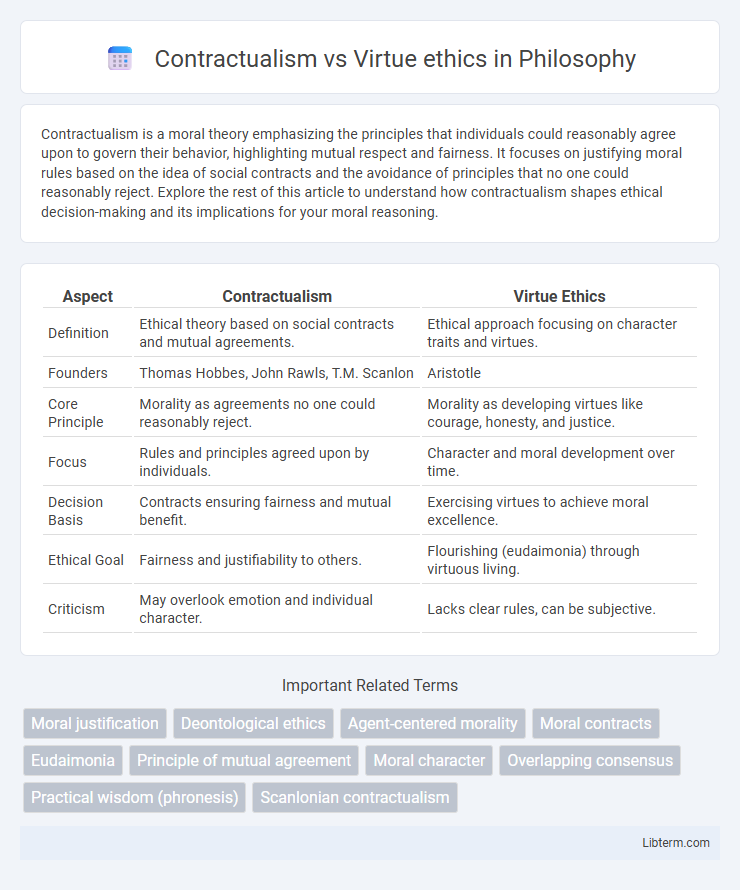Contractualism is a moral theory emphasizing the principles that individuals could reasonably agree upon to govern their behavior, highlighting mutual respect and fairness. It focuses on justifying moral rules based on the idea of social contracts and the avoidance of principles that no one could reasonably reject. Explore the rest of this article to understand how contractualism shapes ethical decision-making and its implications for your moral reasoning.
Table of Comparison
| Aspect | Contractualism | Virtue Ethics |
|---|---|---|
| Definition | Ethical theory based on social contracts and mutual agreements. | Ethical approach focusing on character traits and virtues. |
| Founders | Thomas Hobbes, John Rawls, T.M. Scanlon | Aristotle |
| Core Principle | Morality as agreements no one could reasonably reject. | Morality as developing virtues like courage, honesty, and justice. |
| Focus | Rules and principles agreed upon by individuals. | Character and moral development over time. |
| Decision Basis | Contracts ensuring fairness and mutual benefit. | Exercising virtues to achieve moral excellence. |
| Ethical Goal | Fairness and justifiability to others. | Flourishing (eudaimonia) through virtuous living. |
| Criticism | May overlook emotion and individual character. | Lacks clear rules, can be subjective. |
Introduction to Contractualism and Virtue Ethics
Contractualism centers on moral principles derived from social agreements aimed at mutual benefit, emphasizing fairness and reciprocal respect among individuals. Virtue ethics prioritizes character development and moral virtues such as courage, honesty, and compassion, focusing on becoming a good person rather than strictly following rules. Both frameworks provide distinct approaches to ethics, with Contractualism rooted in social contracts and Virtue ethics emphasizing moral character formation.
Historical Foundations of Both Theories
Contractualism traces its historical foundations to social contract theorists like Thomas Hobbes, John Locke, and Jean-Jacques Rousseau, who emphasized mutual agreements as the basis of moral and political obligations. Virtue ethics originates from ancient Greek philosophers, especially Aristotle, who focused on character development and the cultivation of virtues as essential to human flourishing. These foundational perspectives shape contemporary interpretations, with contractualism prioritizing rational agreements and virtue ethics emphasizing moral character and habitual excellence.
Core Principles of Contractualism
Contractualism centers on the principle that moral norms arise from agreements that no one could reasonably reject, emphasizing fairness and mutual justification. It holds that individuals have obligations based on the terms of an implicit social contract, prioritizing impartiality and respect for persons as free and equal agents. Core to Contractualism is the idea that moral rules are justified only if they could be accepted by all affected parties under conditions of equality.
Essential Tenets of Virtue Ethics
Virtue ethics centers on cultivating moral character traits such as courage, honesty, and compassion, emphasizing the development of virtues that enable individuals to achieve eudaimonia, or human flourishing. Unlike contractualism, which bases morality on social agreements and principles of fairness, virtue ethics focuses on internal character and the habitual practice of virtuous behaviors. This approach prioritizes moral wisdom (phronesis) and the balance of virtues over rigid adherence to rules or contracts.
Moral Reasoning: Agreement vs Character
Contractualism emphasizes moral reasoning based on mutual agreement and the principles that individuals would hypothetically consent to under fair conditions, highlighting the role of rational contracts in ethical decision-making. Virtue ethics centers moral reasoning on the development of good character traits and virtues, prioritizing moral character and intentions over formal agreements or rules. The contrast lies in contractualism's focus on justifiable agreements among agents versus virtue ethics' emphasis on the cultivation of moral excellence within the individual.
Approaches to Moral Dilemmas
Contractualism approaches moral dilemmas by emphasizing agreements and mutual respect among rational agents, focusing on principles that no one can reasonably reject. Virtue ethics resolves moral conflicts by cultivating character traits and practical wisdom, guiding individuals to act according to virtues like courage and justice in specific contexts. Both frameworks prioritize moral decision-making but differ in Contractualism's reliance on collective rational agreement versus Virtue ethics' emphasis on individual moral character development.
Strengths and Weaknesses Compared
Contractualism emphasizes fairness and mutual agreement, promoting clear moral guidelines based on social contracts, which strengthens its practical applicability in diverse societies but may struggle with addressing individual moral virtues or emotions. Virtue ethics focuses on character development and moral virtues, encouraging personal growth and ethical behavior rooted in human flourishing, yet it can be criticized for lacking specific action-guidance and being culturally relative. Both frameworks offer complementary insights, with Contractualism excelling in justice and societal structure while Virtue ethics highlights moral character and holistic ethical living.
Practical Applications in Modern Society
Contractualism emphasizes social agreements and mutual respect as a basis for ethical decision-making, making it particularly effective in legal frameworks and organizational policies where rules and duties promote cooperation and justice. Virtue ethics, centered on character development and moral virtues like honesty and compassion, guides individuals in personal and professional contexts to cultivate integrity and ethical behavior beyond compliance with rules. In modern society, integrating contractualism's emphasis on fairness with virtue ethics' focus on moral character enhances ethical leadership, conflict resolution, and community building.
Major Criticisms and Challenges
Contractualism faces major criticisms for its reliance on hypothetical agreements, which may exclude non-rational beings and marginalized groups from moral consideration. Virtue ethics struggles with its subjective interpretation of virtues, creating challenges in applying consistent moral guidance across diverse cultures. Both frameworks confront difficulties in addressing complex modern ethical dilemmas due to their foundational principles and practical implementation.
Conclusion: Bridging Contractualism and Virtue Ethics
Bridging Contractualism and Virtue Ethics reveals a complementary ethical framework where Contractualism emphasizes justifiable moral principles through rational agreement, while Virtue Ethics focuses on cultivating moral character and virtues. Integrating these approaches encourages individuals to develop virtuous dispositions that align with fair social contracts, promoting both personal moral growth and collective justice. This synthesis fosters ethical decision-making that balances communal obligations with individual moral excellence.
Contractualism Infographic

 libterm.com
libterm.com